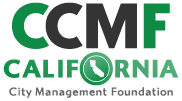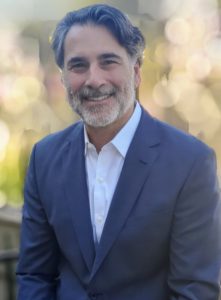Q&A with Paul Arevalo, CCMF Board Member and City Manager of West Hollywood.
What attracted you to a career in local government?
Regarding government services, local government has always been where the rubber meets the road. While larger-scale policy and decision-making take place at the federal, state, and county levels, I am always inspired by the work and accountability that occurs in our cities. It is exciting and a point of pride to see creativity and results-oriented practices at the local level.
I come from a family of public servants who worked in local government and I followed in their footsteps. When I began my career in local government in the 1980s, I was given an opportunity by Dave Bass, the Finance Director of Bell Gardens. When offering me the job, he admitted to me that I was not qualified to be his Assistant—but he took a chance that I would be the right fit and that I would learn on the job, which I did. The trajectory of my career began because I was given a chance to prove myself, and I’m incredibly grateful to have been offered that opportunity.
What was your path to becoming a city manager?
When I came to the City of West Hollywood in 1990, I was hired as Finance Manager. I then moved up the ranks to become Director of Finance and Technology. I was totally content as a department head (in fact, becoming a City Manager never crossed my mind). But, one Monday as I was driving home, I received a phone call from a Councilmember during closed session asking that I come back to the special closed session. They informed me that they had ended the then-City Manager’s contract and they asked me if I would serve in the role on an interim basis. That was in 1999. I’ve now been in the City Manager chair for nearly 22 years. Initially, there was a lot to learn on the job; after more than two decades, I am still learning.
What project are you most proud of from your time as a city manager?
When I took on the City Manager role, the City of West Hollywood’s roadway improvement reconstruction project on Santa Monica Boulevard/Historic Route 66 was underway. I quickly realized how deep the impact of construction was on our business community along the commercial corridor. I dove right into this new role and, suddenly, I was on the deep end of the pool with no life preserver. It was a two-year-long project and I quickly learned to navigate through the challenges we faced. The result was an incredible streetscape that thrilled the community and won numerous awards. I am very proud of it.
During the past two decades, we have achieved several ambitious Capital Improvement Projects including the LEED-certified West Hollywood Library and incredible improvements in progress at West Hollywood Park. The thing I’m most proud of, however, is successfully working to build resilience and fiscal sustainability. The City of West Hollywood was incorporated in 1984, so it’s a relatively young city. The City had been founded with progressive ideals by an incredible convergence of LGBTQ activists, seniors, and renters, many of whom would be regarded as outsiders from the mainstream. So, lots of people were betting on the City to fail. Instead, we built a City government with a robust local economy and a sound fiscal infrastructure. It is our long view on economic sustainability that allows us to be a vibrant and an extremely forward-thinking municipality with consistent AAA Bond ratings to leverage future project planning. It is what pulled us through the 2008 recession and what is carrying us forward as the COVID-19 crisis ravages the base of our economic engines.
What do you enjoy most about being a city manager?
The saying goes: “it’s lonely at the top.” But that is not at all my experience as a city manager, and this opinion is shared by many of my close colleagues and friends in other cities. Like many city managers out there, I am surrounded by extraordinarily talented people at all levels of the organization. What I enjoy most is setting the course among a group of incredibly smart and creative staff members, Councilmembers, board members, commissioners and constituents. We often joke that West Hollywood is a highly engaged community. At best, that is an understatement. But that is also what I love about this city: our high level of engagement with one another creates great energy. I feel lucky because my daily interactions are not limited to executives and management; I have constant interaction with staff at all levels of the organization.
I do not have time to micromanage staff and do my job well, let alone do anybody else’s job. To that end, we have set a tone and a culture in the organization that gives our professional staff room to be highly results-oriented within a laidback and casual framework. When people come from outside the organization, they often remind me of just how casual and happy our staff is and how doing business with West Hollywood is vastly different than with other government agencies. There is a high degree of positive energy in our ranks and that recharges my battery every day. It is what I enjoy most of all, to be surrounded by highly motivated, positive people at City Hall and in our community, which is what makes West Hollywood unique and special.
When and how do you interact with the residents of your city?
West Hollywood is very engaged, and our City government encourages and promotes connectivity and dialogue between City Hall and the community. West Hollywood is a community that emerged from activism, and there’s no shortage of issues for our municipal government to address from neighborhood livability to human rights to progressive politics to health policy and social services. Our city’s two-way relationship with our community is part of our DNA, and day-to-day interactions with the community shape our municipal government. On a daily basis, I interact with West Hollywood’s community leaders, whether they are local business owners, leaders of resident groups, or local associations. I get lots of calls, emails, and texts, to be sure. A business leader once said to me: “the residents think they own the city!” and, from my perspective, that’s a good thing. That is key to making the entire city work. We have an active and engaged community that takes ownership in the direction of the policies that touch their lives, and it is a really good thing when people feel like this City is theirs and they own it. It is not always easy to deal with community issues and concerns, but our close interactions are critical to moving through complex issues and satisfying diverse voices.
What are two of the greatest challenges facing city managers in California today?
The greatest challenge facing City Managers today is the COVID-19 public health emergency and the associated economic crisis. These are long-term issues that we are going to be dealing with for years to come, not only in supporting the social and healthcare infrastructure in our communities, but also in developing new methods of economic support as our businesses struggle in the brick-and-mortar economy. Residential life has been impacted with renters who cannot afford to make their rent payments and the commercial office market is also going to change forever because of the pandemic. The other great challenge we are facing is a crisis highlighted by the COVID-19 crisis: ongoing and deep systematic and societal inequities. We cannot fully recover from the impacts of COVID-19 unless we also deal with the root causes of inequities. Local governments are well situated to make progress on social justice and equity work, all of which has been brought to the surface with COVID-19 and police-involved killings. City managers have a tall order with lots of challenges and, especially with short-term economic shortfalls, there’s a huge burden to shoulder in addressing problems that are sometimes beyond the scope of municipal government. But we will all play a role in the solutions to these problems.
As a city manager, how do you help uphold the public’s trust in local government?
I think trust really all comes down to transparency and honesty. In the City of West Hollywood, we aim to be fact-based and reality based. You can’t build trust and relationships in the midst of a crisis. You need to build trust and relationships in daily activities and remain consistent over time. I have been working in local government for more than 30 years, going on 22 years as City Manager, and that requires cultivating and maintaining strong relationships with people in the community. Our City Hall works to humanize, rather than bureaucratize, the organization’s relationship to the West Hollywood community and we seek to be consistent, honest and sincere.
What are some of the benefits of a council-manager form of city government?
The main benefit is that a council-manager form of city government offers consistency in administrative and executive support for the City Council’s policies and long-term vision for the community. This is especially so in our community and with our City Council in how it has allowed our City, over time, to push the envelope, to seek creativity in our approaches, and to explore policies that are unique. Having professional staff that is objective and that provides advice and counsel to manage work with an objective perspective provides a strong foundation and offers continuity to the organization and to the community.
How does the issue of local control impact the future of California?
Local control is critical to the survival of cities and is important in the delivery of community services to the 37 million people living in the California’s incorporated cities. There have been historical challenges as we battled with State on funding and local land-use issues. Being championed by the League of California Cities, and with a strong and consistent voice, West Hollywood clearly and strongly defended local control. That being said, we should use our local control to help address regional challenges that expand beyond city borders to help support the greater aims of developing affordable housing, working collectively for social justice, developing broad equity in policing and caring for our community members who are experiencing homelessness.

